Rick Wayne's Blog, page 24
March 29, 2020
(Art) The Sci-Punk Savages of Dirty Iron
[image error]
The sketches and drawings of Shanghai artist Yang Jialun (AKA Dirty Iron) present a wonderful contrast. While on the one hand they are rendered with blueprint-like precision, on the other, their subjects are grimy and grotesque: cyborgs made of doll heads and engine-blocks, beheaded aliens, and horrific pincer contraptions that seem cobbled from junkyard parts are all presented with eye-catching detail.
Find more by the artist on his ArtStation page.

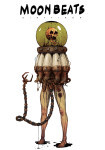

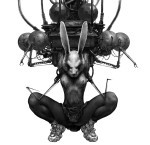

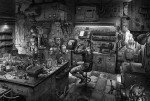
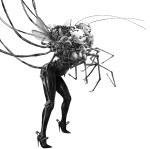
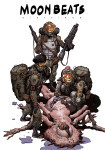

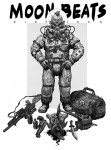

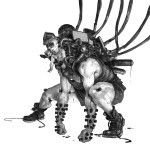
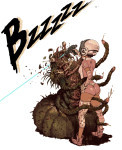
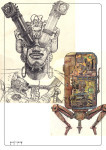
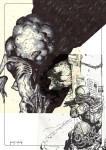
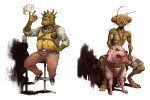
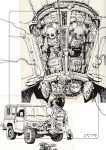
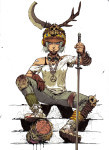
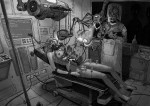
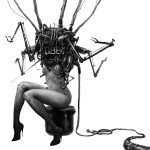
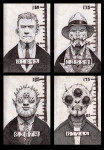
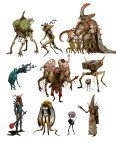
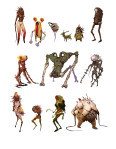

March 27, 2020
(Fiction) The Shri-class Intelligences
[image error]
Balram was right about one thing. Sonrisa was hesitant to leave the farmhouse. She doubted she’d be allowed to return.
She leaned her bike deftly into a turn, right, then left, moving through the empty country road with ease. “Can I ask you something, Shri? Or are you busy?”
“I am only operating at 16% capacity. But Krishna is very busy today.”
There were six licensed Shri-class intelligences—that anyone knew about anyway. Krishna and Balram worked in tandem with civil and administrative agencies in treaty-signing jurisdictions. Shri Ganesha was the research entity, its time doled by lot to various institutions of higher learning. Shri Vishnu was the medical intelligence and assisted doctors and hospitals across the globe. The last two—Shiva and Kali—were widely believed to work for the military and intelligence community, although their existence had never been officially confirmed.
Technically there was a seventh, Brahma, although it wasn’t engineered like the others. It designed them, in fact. Brahma had only one function: to investigate the theory and structure of consciousness, and to design the next class of AI. The Shri-class was the most advanced to-date, with a modular matrix capable of upgrading itself based on periodic missives from Brahma, who otherwise contemplated consciousness in total silence. It wouldn’t be until it discovered an entirely new matrix design, a configuration the Shri-class couldn’t achieve by live upgrade, that a new class would be opened.
Only no one had any idea when that would be, including the Brahma intelligence itself, which ran consistently at 97.34% capacity and never said a word.
“What’s the matter?” Sonrisa teased. “Krish doesn’t want your help?”
The two machines were brothers. And acted like it.
“What can I help you with, Officer?”
That was Balram’s way of reminding her that, busy or not, she wasn’t supposed to waste its cycles with pointless questions. Or maybe it just didn’t want to talk about Shri Krishna.
“Why did you assume I didn’t know what a Hadrosaur was?” Sonrisa slowed and banked up the on-ramp to the interstate. As she took the turn, her bike turned near sideways and rolled on the sides of its wide tires.
“During the MacHannon case, you exhibited an incomplete understanding of basic stoichiometry.”
She had a rough idea how the Shris interacted with humans. They kept a personalized protocol file for everyone they encountered and updated them in real time with every interaction. Sonrisa would’ve liked to see her file.
“So you assumed I was deficient all comparable information.”
It was a “dumb” assumption but the most statistically efficient.
“Yes.” A pause. “Did I offend you, Officer?”
“No.”
Sonrisa smiled under her helmet, which had turned the color of charcoal in reaction to the sunlight cutting through the clouds. Balram had added her formal title to its query—a subtle mark of deference to proactively diffuse a potentially damaging social interaction. She wondered if that was part of its program or if it had made the decision on its own.
It came back after a pause. “Can I ask the purpose of your query?”
“Of course.” Some of her colleagues preferred to keep the machines at arm’s length. Some refused to work with them at all, unless absolutely necessary, on the theory that the more you interacted with them, the more detailed a psychological profile they developed. Given enough data, the Shri intelligences could predict human behavior with startling accuracy. Whatever they learned about you was theoretically, if not legally, available to the government and any number of cyberdefence contractors.
But Sonrisa preferred an open relationship. The government would find out what it wanted anyway, and the Shri-class—like any partner—were most useful when there was a common understanding.
“Have you ever made comparable assumptions about any of the others?” she asked.
Another pause. “Yours is a special case.”
“Of course. I don’t suppose you want to tell me what I’m rolling into?”
“I’m afraid I don’t have that information,” Balram said gravely. “I only know that it involves a child.”
rough cut from a work in progress, a project I have been calling SCIENCE CRIMES DIVISION for lack of a real title.
March 26, 2020
(Art) The Anime Gameworlds of Cosimo Galluzzi
[image error]
With their bright colors and otherworldly subjects, the digital creations of game artist and illustrator Cosimo Galluzzi are clearly inspired by Moebius and Studio Ghibli (remarkably similar for being from completely different cultures). With its simplicity of line, his work deliberately invokes the classic era of 16-bit gaming: crystal warriors with glowing blood and wizards with floating heads. In fact, Cosimo also makes quite a bit of pixel art.
It was precisely because his work invoked so many popular entertainment references that I hired Cosimo to do the cover to my first novel, FANTASMAGORIA, which was a reflection on entertainment taken to the extreme — a synthetic gaming planet is abandoned and turns feral.
Find more by the artist on his website.
Click for larger images.
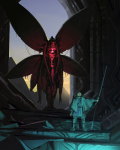
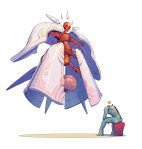
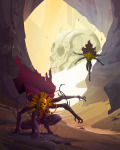

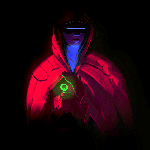

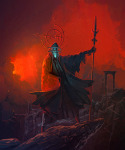
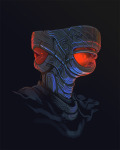

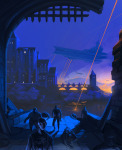
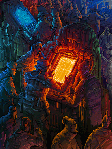

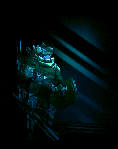

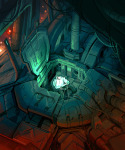
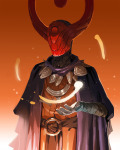
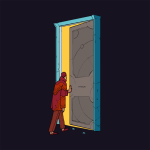



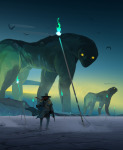



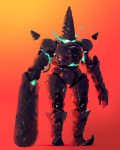
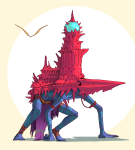
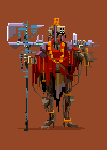
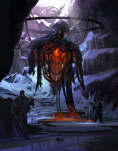



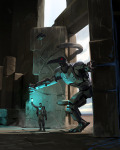


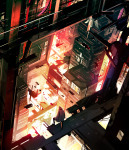
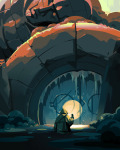

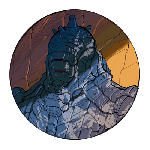

[image error]
March 25, 2020
(Curiosity) The Planck length as a “pixel” of our universe
[image error]
One of the chief characteristics of simulations is low information density compared to the phenomenon being simulated. Even very complex simulations with relatively high information density will still fall short of reality — in the same way that high definition images, while noticeably closer to real life than standard definition images, are still clearly not real.
But even what we perceive as reality is a simulation. The human eye has a discrete resolution, for example. The width of the photosensitive cells at the back of your retina represent the lowest limit of our ability to detect light, but not all photons in the visible range that strike the retina are translated into vision. Some are discarded, first by the simple biology of our eyes (although there’s actually some complicated “averaging” going on there) and then by our brains during visual cognition.
The universe exists in discrete packets of energy we call quanta, the physical manifestation of which is the Planck length, the point at which space can be divided no further. As such, it’s sort of analogous to a pixel on a 2D display (or voxel on a 3D one). Our universe appears to be discrete rather than continuous.
Some have suggested that such discreteness could be evidence that the universe is nothing more than a highly advanced simulation whose resolution is equal to the Planck length. That might explain, for example, why there are only three dimensions — since each added dimension would require exponentially more processing power for little gain, depending on the object of study.
If what you’re studying is life, then three is minimally sufficient since the complex chemical reactions required are not possible on a flat plane. In fact, three may be ideal. Where the reactions necessary for life can’t occur in two dimensions, four might allow substrates to escape reaction centers, making life orders of magnitude more difficult for no real gain.
The simulation hypothesis could also explain the anthropic principle, which states “that any data we collect about the universe is filtered by the fact that, in order for it to be observable in the first place, it must be compatible with the conscious and sapient life that observes it” [Wikipedia]. Universes that cannot evolve life cannot be observed.
If I were simulating a variety of entire universes, especially ones where life could evolve, and I wanted to be as meaningful as possible, I imagine I would opt for more information density rather than more dimensions, especially since each added dimension would come at such a high cost. I imagine I would also want there to be an arrow of time, such as the one we observe, if only to force the simulation forward to some sort of resolution rather than let it spin its tires in a random back-and-forth walk.
Scientists at Oxford famously observed back in 2017 that it’s not possible for this universe to be simulated on a classical computer, since not even the biggest can handle the quirks of quantum mechanics. However, we don’t know that we aren’t in a simulation on any other kind of computer, such as a quantum computer or that our universe isn’t artificial.
I doubt that our universe is a simulation, but it’s certainly the case that each of us lives in one. We’ve already seen how our visual system discards most of the information that reaches it, either by limiting input or by focusing our attention selectively on what remains. Our collective sense of the world is indistinguishable from a hallucination.
cover image: Neuroforest by Matteo Marinella
March 23, 2020
(Fiction) Just don’t let your mom find it
04Oct 14:37
I sat in the car on the side of the road for a good fifteen or twenty minutes. The Cormacks’ teenage daughter was flirting loudly with a neighborhood boy on the leaf-covered front lawn, two houses down on the other side. She was around 17 or so, I guessed, and not much over five feet with blonde hair, a baby face, and growing hips. It was chilly out, and both her and the boy had their sweatshirts zipped and hoods up. They were smiling and talking softly. Every now and again, she would say something in a teasing voice and he would reach forward and try to tickle her. She would dance out of the way and let out an exaggerated yelp, regardless of whether he had connected or not.
Mrs. Cormack opened the front door.
“Brooke,” she called to her daughter, “that’s enough. Come in the house, please.”
I got out of my car. I was easy enough to spot sitting behind the wheel, so there was no sense in waiting anymore.
“But you said we could say goodbye!” the girl objected.
“Brooke,” her mother urged sternly. That’s when she saw me walking up the sidewalk. She stiffened.
“Mom! We might not ever see each other again!”
“It’s okay,” the boy said under his breath.
Mrs. Cormack watched me. I stopped at the end of the driveway. I didn’t want to intrude.
“Brooke. Now,” she said in a stern monotone.
The girl saw me and turned back to her mother. “Just a few—”
“NOW!” the woman yelled.
The girl threw her arms. “But we have all day to pack.” She pointed to the open garage.
It was three-quarters full with lawn care equipment, bikes, shelving, storage—even a table saw. Both the Cormacks’ cars had to be kept on the drive. A pallet of flat moving boxes rested next to a freezer.
“I said . . .” Caroline Cormack stepped forward and took her daughter’s arm. “Get inside right now.”
“I’ll see you later,” the boy said, stepping back.
Brooke pulled free. “God, you’re being such a bitch.” The girl stormed into the house and slammed the door.
I watched the boy trot down the street without looking back.
Mrs. Cormack crossed her arms and looked at me angrily. I think she was deciding whether or not it was worth it to speak her mind—to finally tell me what I’m sure she’d been thinking for months—or to just ask me to leave so she could deal with her child. From where I was standing at the end of the driveway, I could see young Brooke walking diagonally across the backyard toward a sloping ditch at the rear of the property. She must have gone right through the house and out the back. She had her hood up and her hands stuck in her pockets.
“What do you want?” Mrs. Cormack asked.
It was more civil that I expected, and I hesitated.
“There’s nothing for you to say,” she told me. “You’re not welcome here.”
I nodded in understanding. “Of course,” I said. “Please tell him I stopped by.” I turned to leave.
“It should’ve been you who was shot.” She glowered for a long moment. “You had a responsibility.”
She wrapped the folds of her cardigan around her and walked inside. I heard the door shut and lock. She even pulled curtains across the narrow windows that ran down either side of the frame. A few moments later, the garage door started rumbling down.
I looked at the cars in the drive. A luxury sedan and a full-size SUV. They weren’t exorbitant. The SUV was at least three years old and the sedan a little older. Neither were top of the line. Neither were outside the reach of a frugal detective. But both were definitely nicer than my car.
I walked along the neighbor’s yard to the ditch that ran along the back of the houses. There was a row of young trees, the kind that survived by growing at the thin margin between public and private property where workers on both sides were sure it was someone else’s job to clear them. Past that was a grassy slope that ended at a concrete-lined ditch, long overgrown—a holdover from some earlier use of the land. At the other side was a fence and then more housing. The girl, Brooke, was sitting on the embankment, out of sight of the house. She had a lit cigarette. There was an old pile of butts at her feet and quite a few others scattered around. The area around her had been mostly cleaned of overgrowth, I suspected so the neighborhood kids could gather there and do some skating.
Brooke had a lighter in her hand and was flicking it over and over like she wanted to do something with it.
“Looks like we had the same idea,” I said.
I surprised her. She glanced to me and then quickly turned away. Her legs moved like she was going to get up. But she didn’t. I suspected that was because she didn’t want to risk being seen by her mother, who would no doubt soon discover she was gone.
“Can I bum a light?” I asked.
She extended the lighter without looking at me. I took it and pulled a cigar from the inside pocket of my sport coat. I rolled the end in the flame to char it. She either got curious what was taking so long or smelled the smoke, because she turned her hood enough to catch a glimpse.
“You smoke cigars?” she asked.
I took a puff with the end in the flame and it flared. “Bother you?”
She shook her head. “I didn’t know girls smoked cigars.”
“Girls can do whatever they want.”
I handed the lighter back.
She rolled her eyes. “That’s not what I meant.”
“Then what did you mean?”
She watched as I took a couple puffs to make sure it was lit.
“What’s it taste like?” she asked.
I looked at the cig in her hand. “How old are you?”
“How old were you when you started?” she asked, turning away from me a little.
I made a face. “Good point.”
I handed her the lit cigar. She took it and held it awkwardly. She barely touched it with her lips. The stream of smoke rising from the lit end sputtered as she drew, but it was weak and she barely exhaled enough for me to see. She made a sour face and handed it back. I took the cigar and sat down—not close to her but not far either. We sat there smoking for a few minutes in silence. She finished her cig and lit another.
“Why did you come here?” she asked.
“Same reason you did. Needed a break after your mom—”
“No. I mean why did you come?”
I shrugged. “Dunno. Seemed like I should at least stop by. Pay my respects. Say I’m sorry.”
“Are you?”
I turned to her. “What do you think?”
She shrugged. “People say my dad was . . . You know, that he was going to be arrested. And stuff.”
“Who told you that?”
She shrugged again. “No one.”
“Well, even if he was, he’s still your dad.”
“Yeah.”
“You got anyone you can talk to?”
She shrugged a third time, as teenagers do.
“You know, not to go all ‘old person’ on you, but I had a hard time with my folks when I was around your age.” I waited a moment to see if she got it. I don’t think she did. “When they found out I was gay.”
Her face got a little pink. “I’m not gay,” she said meekly.
I snorted in humor. Smoke blew from my mouth. “Yeah. I wasn’t saying you were. Just that I know how important it is to have someone you can talk to. Just because you’re not the one in the wheelchair doesn’t mean you’re not having a hard time with all of this as well.”
“Yeah.”
I waited to see if more came. It didn’t.
“That was all.” I stood. “Thanks for the break.”
“What do you do?” she asked. “Like, what department are you in or whatever?”
“Homicide.”
“So you find killers.”
I nodded. “I try.”
“Who do you talk to? About the bad stuff?”
She was a sharp kid. Called me on my own BS.
“I had a doctor. For a while.” I took a long puff on the cigar. “That helped,” I lied.
“What happened?”
“He said I was crazy.”
She smiled and exhaled just short of a laugh. It was genuine.
“Really?” Her posture relaxed.
I nodded.
We were quiet for a minute. I was still standing. She was still sitting.
“Mom says we’re gonna hafta sell the house and move someplace. I’ll have to change schools. And she was looking for jobs. On the internet. I saw it in the browser history when I went to look for this video my friend sent me the other day so I could show Jordan.” She stopped, but I could tell there was something else. “She was looking at divorce lawyers,” she said. “I don’t think she contacted any of them. But. She was looking.”
“I wouldn’t read too much into that,” I said. “People, ya know, sometimes they just need to think about those kinds of things so they can deal. Or so they can work through things and see what’s a good idea and what isn’t.”
“I know. Trust me. I know my mom. If she was gonna leave, she’d find another guy first. She can’t stand to be alone for, like, five seconds. But it’s just, she was looking, you know? I know how she feels about my dad. But she was thinking about leaving him. He’s in a wheelchair. He can’t breathe without that machine and everything. And she was sitting downstairs—looking.”
I waited again.
“I think she thinks he’s guilty.” She looked to me for confirmation. “You know, of all that stuff. So she was mad because now she has to take care of him and we’re gonna lose the house and everything and we don’t have any money and we have to get a lawyer because the department won’t pay for anything.” She shook her head. “And I don’t think she knows what to do.”
I think Brooke wanted me to confirm her suspicions. That was why I’d been allowed to stay.
Word around the precinct was that at the time of the shooting, Kent Cormack was days away from facing formal charges: conspiracy, money laundering, obstruction. After the shooting, the department was facing a large payout—not just medical bills but disability pension and all the rest. Some of that gets paid through insurance, of course, but just like with regular folks, large claims affect premiums, and Cormack’s bill was going to be measured in millions across the rest of his life.
Thing is, he hadn’t been formally charged, let alone convicted. And there was some question now of whether he ever would be. The department lawyers said, even given the evidence, it would be hard for a jury to convict a permanently disabled police officer who’d been shot in the line of duty, especially once they saw him. Kent Cormack couldn’t go anywhere without a cluster of machines to keep him alive. And of course the PR people gave their two cents. How it would look to the public, they asked, if the department started prosecution now? It would’ve been one thing if he’d already been under indictment, but to charge him after he was shot, when he could barely speak, would seem not only callous but cruel. They pointed out that the union reps would play to that. Legally, they had to. Cormack was a member, and just like anyone, he was innocent until proven otherwise. If the association didn’t represent him to the fullest, he could sue them as well.
So the department found a bureaucratic solution. They neither filed charges nor paid his claim. Part of that may have been greed. But part of it was simply the reality of a finite budget. Brass genuinely didn’t want to take support from good cops to cover a dirty one for the rest of his life.
The Cormacks got a lawyer, of course. But that left the suit a civil rather than a criminal matter, and it made the department the defendant, both of which made for much softer headlines in the papers. I imagine the idea was that a settlement would quietly be reached, charges would be forgotten, and the city would have a much, much smaller payout.
Of course, what happened to Kent after the money ran out was the Cormacks’ problem.
“What’s your dad say about all this?” I asked.
She shrugged. “He doesn’t say much. He can’t really talk. I know he’s mad. He spends all his time writing angry letters. To the department. To his old lawyers, the one we had before that he thinks screwed up the case. To anyone who pissed him off. He’s always got stacks of those big manila envelopes in his room. When I go in there, it’s like he wants to see me, but then he gets embarrassed or whatever and doesn’t want me around. Sometimes he grunts for me to leave.”
“How does that make you feel?”
She shrugged again. “I dunno. Hurt, I guess. But I’m not mad. I just feel bad he’s in his room by himself all the time. Mom barely says two words to him anymore.”
I nodded.
Brooke finished her cigarette and crushed it. “I should go,” she said. She stood. “I’m supposed to be packing.”
I dropped the cigar and pressed the lit end gently with my boot.
“This kinda thing is hard for everybody,” I said. “I don’t have a magic wand, but—” I stopped. “Well, technically there’s one in my bottom drawer, but it’s broken.”
She made a face like she wasn’t a kid and I didn’t have to joke like that.
I reached into my side pocket and handed her my card. “You don’t have to use this. Sometimes it’s just nice to know there’s someone you could call if you needed to.”
She just looked at it at first. I held it closer and she took it.
I watched her walk diagonally up the grassy embankment. “Just don’t let your mom find it.”
a snippet from the third course of my supernatural thriller, FEAST OF SHADOWS.
art by Zach Montoya
March 22, 2020
(Art) The Magical Woodland of Alexandra Dvornikova
[image error]
I’ve used several of these as title images, so it’s only fair Ms. Dvornikova, an artist from St. Petersburg, Russia, gets a post to herself. It looks like she has a book out now, too. Check it out.
Links below.




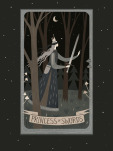
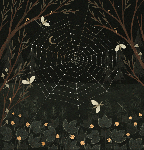
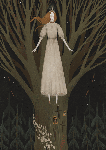

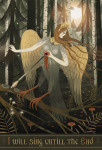
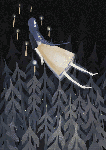
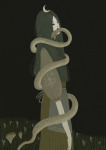



She can be found at Tumblr and also at her Society6 store.
March 19, 2020
(Art) The Sultry Djinn of Ana Mirallès (NSFW)
[image error]
Ana Mirallès is a Spanish comic book artist known particularly for her treatment of erotic subjects. After completing a degree in fine arts, she became an illustrator for several publishing houses. Her first publication came in 1982 with the Spanish adult comic magazine Rambla. She created her most famous work, Djinn, with Jean Dufaux in 2001.



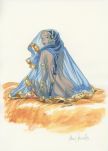
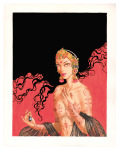

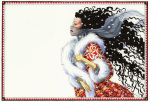













March 18, 2020
I sit in one of the dives/ On Fifty-second Street/ Uncertain and afraid/ As the clever hopes expire/ Of a low dishonest decade:/ Waves of anger and fear/ Circulate over the bright/ And darkened lands of the earth,/ Obsessing our private lives —W.H. Auden
Faces along the bar
Cling to their average day:
The lights must never go out,
The music must always play,
All the conventions conspire
To make this fort assume
The furniture of home;
Lest we should see where we are,
Lost in a haunted wood,
Children afraid of the night
Who have never been happy or good.
—Selections from W.H. Auden’s “September 1, 1939”
March 17, 2020
(Fiction) Scratch ‘n Sniff
[image error]
The neighborhood dated from the previous century. There was hardly a curb. Deep green lawns sat nearly level with the street. There were no fences. Each yard blended into the next. The Arneson house was third from the corner. A sign on the mailbox confirmed the family name. A boat of an Oldsmobile in the driveway had a square magnetic sign affixed to the doors on both sides—black text on a white back ground:
HEADACHES
are NOT from God
call,
1-507-821-1506
There were signs and placards in the yard with Bible verses over pictures of babies.
Quinn got out and stood before one. “I bet her neighbors love her.”
Nio read it out loud. “Whoever blasphemes the name of the Lord shall surely be put to death. All the congregation shall stone him. The foreigner as well as the native, when he blasphemes the Name, shall be put to death. Leviticus 24:16.”
The words WHOEVER, LORD, FOREIGNER, and the last instance of DEATH were printed in red capital letters. Next to it, a smaller sign, of the type used to announce a yard sale, depicted the bust of John Adams before an image of the US Constitution. The words We The People in script letters were clearly visible. Underneath, a red box with white text gave a quote:
“Our Constitution was made ONLY for a moral and religious people.”
At the very bottom was a web address—www.Godis7.com.
“Remember the deal,” Agent Quinn said, walking to the front door.
“Mrs. Arneson?” he asked a moment later. “Mrs. Maureen Arneson?”
The door had been cracked open before they knocked. Nio could see the shape of the thin woman on the other wide but none of her details.
“It’s Miss,” she said hesitantly. “I never married. Who are you please?”
“I’m Agent Quinn of the FBI.” He held up his ID. “My associate and I would like to talk to you about the report you filed with the Brown County Sheriff’s Office. May we come in?”
There was a long pause. A few stray black flies buzzed about, and Nio swatted at one.
“Of course.” The woman’s voice shook, as did her hands when she unhooked the latch and let the door swing open. She didn’t wait to greet her guests, but walked straight to the kitchen for a glass of water, which she poured right from the tap. Maureen drank the water in one breath and gasped. She pressed the back of her hand to her mouth.
“Are you okay, ma’am?” Quinn’s feet sunk into thick but faded teal carpet. It was old but still plush, suggesting it had not only been well-maintained but hardly trod. “Should we come back another time?”
“No,” she said, turning slightly to smile at them. But she was still leaning against the counter, gripping it with on hand for support. “Please come in. Forgive my manners. I . . . I just—I guess I never expected the FBI. You know what I mean.” She smiled weakly and set the glass in the sink.
She turned confidently and stepped toward Nio with her hand extended. “I didn’t catch your name.”
“Nio.”
“Nigh-oh,” Maureen repeated awkwardly, as if intending to highlight the unusual name. “Are you with the FBI as well?”
“Ms. Tesla is a consultant,” Agent Quinn explained. “She’s helping us with one of our unsolved cases.”
“Tesla? Like the scientist?”
“Yes.”
“There can’t be many people with that name,” Maureen blurted in a half-laugh, half-cry. But she recovered immediately.
“Are you sure you’re okay?” Agent Quinn asked skeptically.
Maureen walked to the door and shut it and replaced the latch. “Yes. I’m fine. Thank you.” Her hand lingered for a moment. Then she turned and walked back to the kitchen. “I just need to take my pills, I’m sorry.”
“Please don’t apologize. If this isn’t a good time—”
“No, no,” she said. “Now is fine.” She started opening cupboards. Almost all of them were bare. “I just need to take my pills. Give me a moment.”
“Take your time, ma’am.”
Nio and Quinn waited in silence. The infamous TV stood by the wall near the kitchen. Across from it was a small couch. Near the hallway stood a round, cafe-sized dining table next to a recliner adorned with a knit cover. Both faced the television. Next to a magazine holder, which was full, were three stacks of small boxes with labels indicating they had come from a local printer. Inside were pamphlets and printed materials repeating many of the same messages from the lawn. Nio lifted one titled “Scripture Lessons for Healing.” Small circular pictures of smiling faces sat next to short testimonials describing how various serious medical problems abated or were miraculously healed when sins were released. One woman’s diabetes was cleared after she admitted her infidelity to her congregation and was born again in Jesus.
The testimonials were conveniently duplicated in Spanish on the back.
“What is it you do, Ms. Arneson?” Nio asked. “If you don’t mind us asking.”
“I print and distribute God’s Holy Word,” she said after swallowing a pill. “Mostly online.” Then she swallowed several more. Her hands were shaking.
“Is that your primary source of income?” Agent Quinn followed up.
“Yes, I sell in bulk. I mean, I don’t only sell in bulk. I sell to individuals also. But mostly I sell to churches. Religious organizations. Christian schools. I work with several schools, actually. I try to sell as cheaply as I can. As you can see, I keep a very modest lifestyle. The house is paid for. Left to me by my grandfather. I can live very frugally.”
“Of course,” Agent Quinn said. “I apologize if the question seemed pointed.”
“I understand how it works,” she said. “It’s a test,” she added after a pause. “You have to decide whether or not I am a trustworthy witness.”
She took a deep breath, like she was getting up the courage to ask her boss for a raise, and stepped from the kitchen. “You want to talk about the messages, I suppose. You’re trying to figure out how it was done.”
“Well, we’d like to hear it from you before we start jumping to conclusions.”
“That’s very open-minded of you, Agent Quinn.”
“Is that the TV?” Nio asked, although she knew the answer.
“Yes.”
It sat on the patterned carpet. It was enormous, jutting out several feet from the wall. Even so the rounded square screen was terribly small by contemporary standards. The rabbit ears on top rose from a detached plastic dome connected to the behemoth underneath by a wide, grooved cord. Next to the antenna was an old Panasonic VHS player. Homemade tapes filled a stand near the window—sermons, or so it seemed by the titles, all numbered and dated.
“May I look?”
Without waiting for an answer, Nio got on her hands and knees. She pulled at one of the dusty cords. It wasn’t connected by plug the back. It was physically attached to the box, emerging from a gasket-lined hole in the particleboard. Everything looked original, even the screws, which slightly tarnished with age and unscuffed.
“Naturally, I didn’t believe it at first,” Maureen told Quinn.
“What did you think it was?” he asked.
“I don’t know. Something like that happens to you, you don’t know what to make of it, do you? It seems like it has to be fake. I know about hoaxes, Agent Quinn. The neighborhood children ring my doorbell sometimes and run away. Sometimes they leave things. Sometimes I can hear them laughing from behind a tree. I don’t blame them. I don’t blame children. I understand why they do it. Children copy what they see. They hear their parents making fun in the car, or blaspheming the Lord, and they do the same. But why would someone do this? It isn’t that I thought it was real. You know, I—” Her mouth hung open. “What was I supposed to think? So I went on with my life. I thought it was just some crazy thing. What else could I do? When it happened again, I got angry.”
“Angry?”
“Yes. I thought, ‘Leave me alone!’ I might’ve even said it out loud. Or screamed it.” She smiled. “But still, I just tried to get on with my life.”
“Like Moses,” Agent Quinn interjected.
Maureen’s head turned curiously. “Yes. Yes, that’s it exactly. He didn’t want to believe either. I suppose no one does at first. After it happened the second time, I got very worried.”
“Worried?” Nio asked,
“Yes. You can ignore anything once. Once it happens twice, it’s a pattern. It might happen again. It isn’t even that I believed. It’s the fear. The fear of not knowing when or if it will come back. Because the TV is always there. Watching you watching it. And so I started to search for the voice, not because I believed, but because I didn’t. I wanted to prove it wrong. To find the hoax. I didn’t feel comfortable in my own home anymore, not when someone can come in like that whenever they wanted. I was nervous all the time. I lost weight.” She ran her hands down her cardigan and simple long skirt, both of which were loose. “More than anything, I didn’t want it to surprise me, like a child jumping out from behind a tree. I wanted to find it first. So I looked. It become part of my routine, like locking the doors at night or brushing my teeth before bed. And when it happened again, I was relieved, not because I believed it was the Angel of the Lord but because this time it didn’t surprise me. This time I was ready. And I listened, I listened very closely for clues that would give away the huckster. It was like a puzzle, a difficult crossword. After the fourth time, I started keeping a journal—what time it happened, what it said. Because I knew I needed proof. You can’t just walk up to someone and say you’re hearing voices in your television. Imagine saying that to the local police, looking like me. Who was going to help me? My neighbors? They already think I’m crazy. If I said something and one of them went to the police first—out of concern for me, out of fear for their children, it doesn’t matter—then it’s worse. Then it looks like I’m trying to hide it. Or I made it up. I didn’t want to admit it to anyone, you see. Not until there was proof. And I wasn’t going to. Even after the fifth time. The sixth time. Even after he told me about the arson. But by then he had told me so many things, and they were true, and how is that possible?”
“What kind of things?” Quinn asked.
“Things about my grandfather. Things that happened a very long time ago.”
Nio noticed Maureen’s eyes drift to a faded photo on the wall—a man of about 40 taken circa 1980, judging from the clothes and the car in the background. The picture hung over the stand of taped sermons.
“Is that him?” Nio asked.
“Yes.”
“What was he like?”
“Is that important?”
“He left you the TV. I’m just wondering if there’s a connection. Was he a religious man? Could it be him who’s speaking to you?”
“No, no of course not.”
“Why do you say that?”
“He wasn’t . . . He believed in God, but he—” She struggled with the words. “He did his best, I suppose.”
“What else did the voice tell you?” Quinn asked.
“Besides that a swarm of black flies would descend?” She laughed incredulously.
“It mentioned flies specifically?” Nio asked.
“No,” she said defensively. “It said there would be a sign. A sign everyone could see.”
“Of course.” Nio smiled calmly. “Do you mind if we take a look around?”
“May I ask why? The TV is here.”
“With cases like this,” Agent Quinn jumped in, “where people will naturally be skeptical, we have to rule out other possible causes. Transmitters or speakers. We have to look, if only to say that we looked. It’s entirely voluntary of course.”
“I’m not making it up. I don’t need the attention.”
“I don’t think you are, Ms. Arneson. Your faith is obviously very important to you. But the people I work for haven’t met you and they’ll want to see in my report that we’ve done our due diligence and taken the matter seriously.”
“Are you Christian, Agent Quinn?”
“My mother was Orthodox.”
“I see. I’m sorry.” She shut her eyes immediately. “I didn’t mean to imply—”
“It’s alright,” he said with a smile. “No offense taken.”
“Thank you.” She motioned them forward. “Please. I have nothing to hide. You can start in the bedroom if you like, Agent Quinn. The guest bedroom, I mean,” she corrected quickly. “It’s at the end of the hall.”
“Um.” Quinn glanced to Nio, who shrugged. “Sure. Of course.” He walked toward the back, stopping to examine the row of old photos in the hallway.
“What else can you tell me about the angel?” Nio asked.
“What is there to tell?” With Agent Quinn out of the room, Maureen suddenly seemed very nervous.
“How long have you known him?”
“Is that supposed to be a trick question? I don’t know him. He speaks to me through the television. It’s not a conversation.”
“And you heard it first when you turned off the VHS?”
“Yes, exactly. It surprised me.” She wrung her hands.
“Do you mind if I turn the TV on?”
“Be my guest.”
Nio pulled the tab and the behemoth clicked. As the screen warmed slowly, static appeared. Nio knelt in front of it. There didn’t seem to be any patterns on the screen that could be confused for something else, nor was there any hypnotic strobing.
“Does he have a favorite channel?”
“Are you mocking me? We didn’t watch shows together.”
“Not at all. It’s just the TV has to be set to one channel or another.” She motioned to the dial. “I was just wondering which one. Is it always the same?”
“No. Sometimes I have to look.”
Maureen watched Nio turn the channels one at a time. “Can I get you something?” she asked. “A drink perhaps.”
“I’m fine.” Nio smiled at the woman. “What did he sound like?”
“Inhuman,” she said quickly. “The voice was deep. Deeper than any voice—any sound I’ve heard. It wasn’t like a slowed down recording. It was normal speed. And it seemed to fade out.”
“Like lose volume?”
“Like get so deep I couldn’t hear it anymore. And there were words I didn’t recognize. Not English. Not any language. I looked them up. Almost like it was speaking with two voices at once. And the static on the TV . . .”
Nio looked at it.
“You think it’s a hoax, don’t you?” she asked, walking to the kitchen.
“I believe someone is speaking to you through your television, if that’s what you mean.”
“But if it’s just a man, why did he sound that way? How did he know all those thing? Personal things. Intimate.”
Nio could think of half a dozen ways, from data mining to audio surveillance. They were all unlikely, but far less unlikely than that the Angel of the Lord was speaking through a cathode-ray tube. But indirect logic would never convince Maureen Arneson. She was a simple, modest woman. It would never—it could never—seem likely to her that anyone would take that kind of interest. What for? To her, the patent reality of God would always be the simpler explanation.
Like her, her TV was an open receiver. It would play whatever signal it received. It was also analog. Since broadcast television had gone wholly digital, there were no competing signals to obstruct a pirate transmission. TVs that could pick up an analog signal were all but extinct, making it very unlikely that anyone besides Maureen would be listening, especially if the signal were very weak—transmitted from a van down the block perhaps.
Of course, that still left Maureen’s all-important question—or what Nio assumed her question would be: why go to all that trouble? Why her?
The answer had to be in that house somewhere.
Nio stood and looked around the living room. It was tidy and sparsely furnished, but there were still a million places to hide something—not just the attic and the garage but the cabinets, the little nook of cubbies that hung from the wall near the bedrooms, the closets, the home office, stuffed with boxes and materials. It would take a team of men days to search it all.
“Has it asked you to do anything?” Nio asked. “Give money to someone, perhaps?”
No answer.
“Ms. Arneson?”
When there was no answer, Nio stood and walked to the kitchen. Maureen Arneson was staring out the back window. When she saw Nio, she looked away briefly in embarrassment and then began opening drawers stuffed with papers and coupons, as if she were looking for something.
“He said there would be a sign. He said everyone would see it. He said it was God expelling evil from the land and that having driven it forth, I should be prepared to face it in His name, but that I would not know the time of the coming and I needed to be ready.”
“And what were you supposed to do?”
“He said there would be a sign,” she repeated. She was searching frantically. Her hands were shaking. “Say what you want, but a plague of flies of a pretty big effing sign!” She covered her mouth and gripped the counter as if for dear life.
“Ms. Arneson, are you okay?”
Maureen pulled something from the drawer.
Agent Quinn wandered out of the guest bedroom and into Maureen’s. The four-post bed appeared to be original, as did the quilt on top. Framed photos were set about, mostly of staid individuals smiling genuinely but standing stiffly erect for the camera. The small nook closet was half-covered by a folding door. There was an old sewing machine on a chair in the corner. Under it was a basket of supplies. The mirrored dresser was topped with a knit cover on which Maureen kept her makeup and two prescriptions. Quinn felt awkward invading the woman’s private space for no reason, and he turned to leave, sweeping his eyes over it once as he had been taught at the academy, looking for anything that stood out.
He stopped.
He glanced down the hall to make sure no one was coming. Then he walked around the bed. There was a leather-bound Bible on the nightstand. A place-marking ribbon was draped over the top. Stuffed inside was a manila envelope. It was the only thing in the room that didn’t appear to be at least two decades old. Glancing again to the hall beyond the door, which he could see at an angle, Agent Quinn removed the envelope, leaving the Bible open at the correct page in the Book of Daniel.
Quinn removed the contents—a stack of papers, some of which were folded. On top was a wide photo of a line of teenagers. They were all turned toward the camera but not facing it. They were smiling and joking with each other, as if the photographer had taken the image surreptitiously between formal sets. The title read: The Da Vinci Kids Turn 13. The caption at the bottom listed all of their names in order of appearance. Quinn read across until he found Nio’s name. Third from the last. It was her. She was young. Her face was round and soft. But it was undoubtedly her. Unlike the other eleven, she wasn’t engaged with her peers. She alone gave the camera a casually suspicious look, as if she had guessed what the photographer was doing. She held the hand of the boy next to her, who was looking at a friend several places away and laughing, as if the two of them had just shared a joke. The caption listed his name as Ergod Guevara.
Agent Quinn’s skin pimpled in gooseflesh.
Why would Maureen have this?
Maureen leaned against the kitchen counter, clutching a religious pamphlet. But it wasn’t one of hers. The style was different. It was rough, more like a collage of disjointed messages than a glossy brochure. It conveyed anger and chaos more than order and judgment. The giant cross at the center was made of harsh red scratches. Over it was a grid of thick paper tabs affixed at the top to the pamphlet underneath, as if they were meant to be torn away. But they were tiny. Stamped on each in different color ink was one of four images: a saint with raised hand, a fish, a loaf of bread, a crown of thorns. Maureen scratched one and pressed it to her nostrils, sniffing deeply, orgasmically, with eyes closed. Then she exhaled with force, scratched, and sniffed deeply again.
Nio glanced to the pills she took earlier. The bottle was bare. Completely unmarked. Nio scowled.
Then her eyes went wide.
Maureen saw the reaction. “You’re an abomination,” she cried, clutching at Nio’s arm, keeping her from fleeing. “I will send you back to Hell, soulless creature! In the name of the Lord our God, who has called upon His faithful servant, I strike at thee!”
Nio tried to pull away but Maureen held her, falling to the vinyl floor like an anchor.
“Nio!” Quinn called. His articifical feet pounded down the hall.
“OH!” Maureen doubled over and clutched her abdomen as if suddenly striken with terrible pain.
Freed from her grasp, Nio turned for the door and ran into Agent Quinn, who was rushing to secure Maureen. Nio bounced off the big man’s chest and fell to the floor next to her and was grabbed. But Maureen wasn’t trying to hurt her. She was clutching Nio, holding on like she didn’t want her to leave.
Agent Quinn pulled one of Maureen’s arms free, but she was a spider and clung with the other.
“Get out of here!” Nio kicked Agent Quinn in the shin.
He stepped back in shock.
“She’s going to EXPLODE!”
“What?”
“OH!” Maureen moaned again louder, gripping her abdomen again.
Nio jumped to her feet just as she heard Maureen’s flesh pop twice.
Pop-pop.
The woman’s blouse puffed out in two places. It was as if she were made of popcorn.
A chemical pin had been pulled. They had seconds.
Mere seconds.
Nio launched herself forward and tackled Agent Quinn over the recliner. The big man fell back, as much from shock as from the force of her tackle, and the two hit the carpet. There was another pop, a much larger one, as Nio lifted the table and held it like a shield over them.
One side of Maureen’s belly exploded, ripping her body in half, followed almost immediately by her upper left breast and her thighs. The successive blasts ripped through the house, each with the force of a grenade, blowing out every window and sending the front door bouncing across the lawn.
March 15, 2020
(Art) The Brilliant Colors of Kuri Huang
[image error]
Chinese artist Kuri Huang makes breathtakingly colorful illustrations of mythical figures and fairy tales. Despite the panoply of color, which seems explosive and yet soft at the same time, her palettes are wonderfully sublime.
Find more by the artist on her website.




















